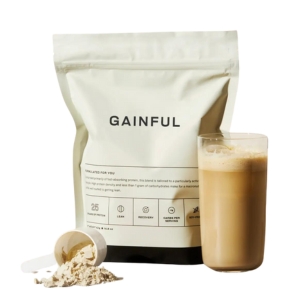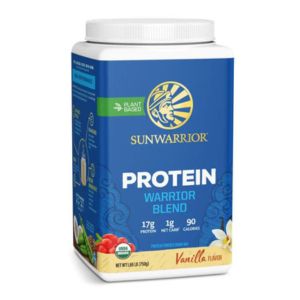 Expert's opinion
Expert's opinion
The article is a subjective view on this topic written by writers specializing in medical writing.
It may reflect on a personal journey surrounding struggles with an illness or medical condition, involve product comparisons, diet considerations, or other health-related opinions.
Although the view is entirely that of the writer, it is based on academic experiences and scientific research they have conducted; it is fact-checked by a team of degreed medical experts, and validated by sources attached to the article.
The numbers in parenthesis (1,2,3) will take you to clickable links to related scientific papers.
Best Protein Powder For Men 2024: Top 5 Brands To Build Muscle
All articles are produced independently. When you click our links for purchasing products, we earn an affiliate commission. Learn more about how we earn revenue by reading our advertise disclaimer.
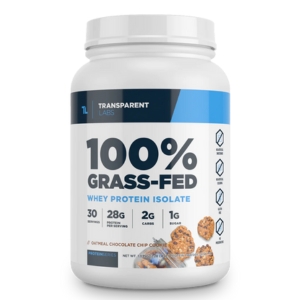
Transparent Labs Grass-Fed Whey Protein Isolate
- 100 % Grass-fed
- Non-GMO, gluten-free
- Higher than average amount of protein (28 grams per serving)
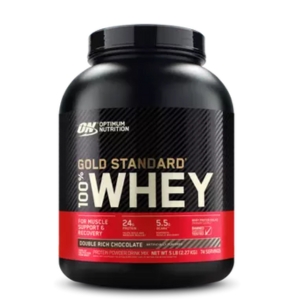
Optimum Gold Standard 100% Whey Protein
- 24 grams of protein per serving
- 5.5 grams of naturally occurring branched-chain amino acids (BCAAs)
- Gluten-free and banned substances tested
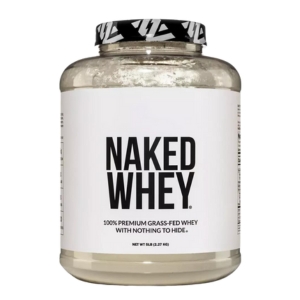
Naked Nutrition – Naked Whey
- Made from only one ingredient
- 25 grams of protein and 5.9 grams of BCAAs
- Gluten-free, non-GMO, and banned substances tested
15% Off Coupon: HEALTHCANAL
Protein powder is one of the most popular dietary supplement products and it’s used to help increase protein intake, build muscle, and aid in weight loss. The most common type of protein powder is derived from animal sources in the form of whey protein. However, there also seems to be a growing number of organic plant-based protein powders on the market, making this popular nutritional supplement suitable for anyone regardless of their dietary preference or restrictions.
Best Whey Protein Powders For Men In (April. 2024)
- Transparent Labs Grass-Fed Whey Protein Isolate – Editor’s choice
- Optimum Gold Standard 100% Whey Protein – Best Non-Grass Fed Whey Protein
- Naked Nutrition – Naked Whey – Cleanest Ingredients
- Gainful Personalized Protein Powder – Best Personalized
- Sunwarrior Protein Warrior Blend – Best Plant-Based Protein Powde
5 Best Protein Powders For Men In 2024
Transparent Labs Grass-Fed Whey Protein Isolate
100% grass-fed, pure whey protein isolate that’s easy to digest and designed to help you build muscle and lose weight.
- 100 % Grass-fed
- Non-GMO, gluten-free
- Higher than average amount of protein (28 grams per serving)
- Mostly available only through their website
Transparent Labs is known in the health and fitness industry as one of the brands with the highest-quality products and the least amount of filler ingredients. Their 100% grass-fed whey protein speaks for itself and comes in a serving with a higher amount of protein than most brands on the market.
With 28 grams of protein per scoop, zero fat, and only one gram of carbohydrates, this protein powder is easy to digest and therefore provides energy pretty quickly. It comes in nine delicious and unique flavors such as cinnamon french toast and vanilla peanut butter, turning your post-workout shake into a craving-worthy dessert. Whey protein isolate undergoes more processing[1], stripping it off fat and carbs, and leaving pure whey protein powder behind. In addition to being low fat and low carb, whey protein isolate contains less lactose, making it suitable for those who are lactose intolerant or sensitive.
Optimum Gold Standard 100% Whey Protein
A definite gold standard in the whey protein powder category, Optimum Nutrition provides a well-balanced whey protein concentrate blend and exceptional value for money.
- 24 grams of protein per serving
- 5.5 grams of naturally occurring BCAAs
- Gluten-free and banned substances tested
- Not suitable for lactose-intolerant
- Not grass-fed
Another supplement brand loved by many, Optimum Nutrition has been at the forefront of protein powders for decades. Their gold standard 100% whey protein powder offers 24 grams of protein per serving with 5.5 grams of naturally occurring BCAAs for optimal muscle building, recovery, and endurance.
It also contains three grams of carbohydrates, one gram of sugar, and one gram of fat, making it a great option for those on low-fat and low-carb diets. Since it’s not pure isolate, it’s not suitable for those who are lactose intolerant as it may invoke uncomfortable side effects.
When it comes to taste, you can choose from 20 different flavors, which makes it one of the most versatile on the market. From banana cream and coffee to chocolate peanut butter and white chocolate, there is something for everyone.
Naked Nutrition – Naked Whey

15% Off Coupon: HEALTHCANAL
The cleanest protein powder on the market, Naked Whey delivers 25 grams of protein per serving and helps you reach your daily protein goals.
- Made from only one ingredient
- Contains 25 grams of protein and 5.9 grams of BCAAs
- Gluten-free, non-GMO, and banned substances tested
- Expensive
- Not suitable for those dealing with lactose intolerance
Naked Nutrition’s Naked Whey is made with only one ingredient: 100% grass-fed whey concentrate. It is derived from non-hormone-treated cows on a small farm in California. Each serving comes with 25g of essential amino acids and 5.9 BCAAs[2] that help muscle-protein synthesis to promote muscle growth and improve recovery after exercise.
They use a special, cold-processing technology that ensures that the nutrients in whey are non-denatured, leaving the essential amino acids, omega-3s, CLA, and immunoglobulins, the antibodies responsible for helping you fight off harmful bacteria and viruses, intact. It also helps keep it more bioavailable and easier to absorb, promoting muscle growth and enhanced workout recovery.
Naked Nutrition is also certified by Informed-Choice Trusted by Sport, a monitoring program that ensures a dietary supplement has been tested monthly for banned substances. This makes it a great choice for athletes who need to be constantly aware of every ingredient they add to their diet
Gainful Personalized Protein Powder
Personalized protein powder to best fit your health and fitness goals.
- Tailored to you and your fitness goals
- Whey, Keto, and plant-based formulas to fit your dietary needs
- Complimentary access to a registered dietitian
- Higher price point
- Not suitable for vegans
Gainful personalized protein powder tailors its formula to you, depending on your personal needs, goals, preferences, and dietary restrictions. Designed to support muscle performance and recovery, each serving contains 19-27 grams of protein, all nine essential amino acids, and absolutely no gluten, soy, artificial flavors, fillers, dyes, or sweeteners.
The protein powder itself is tasteless, so you can choose up to four out of nine delicious flavor packs to best suit your tastebuds. And with every Gainful subscription, you get free, one-on-one access to a Registered Dietitian, who can help answer any questions and offer personalized advice.
Sunwarrior Protein Warrior Blend
One of the best plant-based protein powders for all who can’t digest whey protein or keep a vegan diet.
- 27 grams of protein per serving and 6 grams of BCAAs
- Keto-friendly, gluten-free, sugar-free
- Added MCT for brain health
- Ingredients differ depending on the flavor
Not all protein powder supplements have to come from animal sources. Many brands are focusing on creating the best vegan protein powder and Sunwarrior is definitely leading the way. Their Warrior blend comes with 27 grams of protein per serving and 6 grams of BCAAs.
It’s made out of an organic proprietary blend containing fermented pea protein, goji berry, and hemp seed protein. It also features MCT oil, thus enriching this protein powder in macro and micronutrients that help boost your immune system and promote brain health.
Satisfied customers report this protein powder to be easy on the stomach, mixes well regardless of the liquid of choice, and has a delicious flavor profile within its six varieties.
Do Men Need Protein Powder?
According to the National Institutes of Health, the daily recommendation[3] for protein for average sedentary adults is a minimum of 0.8 grams of protein for every kilogram of body weight (a little over 7 grams for every 20 pounds of body weight).
Still, these amounts vary from person to person and depend on a plethora of factors, such as level of activity, body type, metabolism, dietary preferences, and health and fitness goals.
Some men easily obtain the necessary amounts of protein through their diet, while others need additional supplementation to hit their daily numbers. Protein powders pose a quick and easy option for taking 20-30g of protein in one serving without having to prepare and eat a whole meal.
Protein is an essential macronutrient that’s found in almost every part of the body and it’s a crucial part of basically every process that makes your body function. It’s created out of 20 building blocks called amino acids that make everything from your muscles and organs to skin and hair.
Eleven of these amino acids are non-essential, meaning our bodies make them themselves and it’s not as critical to consume them from food or supplements. The other nine are considered essential as our bodies cannot produce them and they have to be obtained from food or supplements.
These nine include[4]:
- Histidine
- Isoleucine
- Leucine
- Lysine
- Methionine
- Phenylalanine
- Threonine
- Tryptophan
- Valine
And the brands on our list are of high quality, all while delivering the best possible taste.
The most common types of protein supplements include
- Whey protein concentrate – the least processed milk protein, containing all 20 amino acids, a high amount of protein, as well as some carbohydrates and fat.
- Whey protein isolate – a more processed version of whey concentrate, stripping off fat and carbs, leaving only pure protein behind. This is also a better option for those who are sensitive to dairy or lactose intolerant.
- Casein – another milk protein beneficial to muscle growth, but takes longer to digest and absorb
- Collagen – essential for healthy joints, bones, muscle, and skin elasticity
- Vegetarian and vegan protein powders – most commonly made from pea protein, rice protein, hemp protein, and soy protein.
- Other, less popular options such as beef protein powder, egg protein powder, and even insect protein powder[5]
Benefits Of Protein Powders For Men
Protein powders are a great and easy way to get an adequate amount of protein for the day, especially if you’re trying to build muscle and lose fat. Men who are on a fitness journey of building muscle and changing their physique usually need more protein than sedentary people and taking protein powder supplements makes that goal easily achievable.
Here are some of the biggest benefits of whey protein powders:
- Great source[6] of high-quality protein – easy and quick to digest, fast to absorb, and contains all essential amino acids
- Promote muscle growth – rich in BCAAs, especially anabolic-stimulating leucine[7]
- Boosts metabolism[8]
- May help lower[9] blood sugar levels and blood pressure
- May lower inflammation[10]
- May promote the body’s antioxidant response[11] and aid in the fight against free radicals
- May suppress appetite[12], aiding in weight loss and management
Dosage Of Protein Powder For Men
When it comes to the actual dosage of protein powder for men, it depends on a myriad of factors. This includes age, level of activity and body weight, fitness and health goals, and dietary habits and restrictions.
Therefore, figuring out your exact daily dosage can be tricky, and taking too much or too little could potentially hinder your fitness progress. There are several types of protein powders, with some being more effective than others. Still, even though the type of protein you choose depends on your preference, fitness goals, and dietary restrictions, all protein supplements have the ultimate goal of helping you gain muscle.
The recommended daily amount of protein for adults is 0.8 grams of protein per kilogram of body weight. These numbers change depending on whether or not you’re trying to build muscle or not. When you’re following a muscle-building fitness program, you’re putting more work in at the gym and causing more muscle fatigue and microtears.
The fatigue and microtears cause your muscle fibers to break down, and you need plenty of protein to then repair and build new muscle tissue. Many scientists[13] agree on 2.2 grams of protein per kilogram of body weight if you’re trying to build muscle, but some even recommend going as high as 3.3 grams[14].
It’s always best to speak to your doctor before upping your protein intake to this extent, to ensure there are no medical contraindications to doing so, such as a history of kidney disease.
Even though no formula is perfect, generally staying between 1.8 and 2.8 grams of protein per body weight is thought to be best if trying to build muscle. If you’re a more sedentary person, 0.8 grams will probably be just enough.
How To Choose The Best Protein Powder For Men?
Choosing the best protein powder for men depends on a few important factors. Take them into consideration every time you read the label.
- Organic – The USDA organic seal on hydrolyzed whey protein guarantees much higher regulatory standards on how it’s processed as well as how the cows are raised and treated. It also ensures they were not treated with antibiotics or bovine growth hormone.
- Grass-fed – if possible, always choose a protein powder that’s derived from 100% grass-fed cows as it contains higher levels[15] of immune-boosting compounds such as beta-lactoglobulin, lactoferrin, and lysozyme. They improve your body’s immune and antioxidant response and help fight free radicals. Additionally, grass-fed whey contains more conjugated linoleic acid (CLA), a fatty acid that boosts immune function[16].
- Cold-processed – high heat damages nutrients and amino acids, while cold processing helps protect the nutrients and keeps them in their natural state
- 100% pure whey with no artificial additives – many brands use artificial fillers, thickeners, and added sugars to improve taste and consistency, prolong shelf life, and cut costs. Choose the brands that don’t take this route and only use 100% pure whey protein, whether it’s whey concentrate or isolate.
- Dietary restrictions – if you’re lactose intolerant or sensitive to dairy, whey protein concentrate won’t be your best option. Try whey protein isolate or even hydro isolate, or choose a high-quality vegetarian or vegan protein option such as pea protein, hemp protein, brown rice protein, or a combination.
Final Thought
Protein powders are one of the most popular dietary supplements that promote muscle growth, increase weight loss, and aid in recovery. They also bring a plethora of nutrients into your diet, boosting your immune system and improving overall health and well-being. Choose high-quality, organic, grass-fed whey or vegetarian protein without artificial flavorings, fillers, additives, or added sugars.
Frequently Asked Questions
Many people believe that the best time to take protein powder is after your workout as it helps rebuild and repair fatigued and micro-torn muscle fibers. However, research suggests that the so-called “anabolic window,” which was previously thought to be 30 minutes after your workout may not be as critical[17] and that the overall daily protein intake is all that really influences your muscle gain.
Yes, a good-quality protein powder can help you build muscle. It can also lessen the expected[18] decrease in muscle protein synthesis after weight loss.
Drinking protein powders won’t make you lose weight, but when combined with resistance training and cardio, they can help you increase muscle mass and consequently burn more fat. Still, the general rule of eating fewer calories than you expend is the only scientific way of actually losing weight.
Creatine supplementation seems to be effective[19] in increasing lean tissue mass and upper and lower body muscular strength. It’s also seen to be safe to be taken in conjunction with protein powder, whether it’s milk protein or a vegetarian option.
Nutritional facts vary between protein sources and also between protein powder brands. Whey protein concentrate usually contains around 20 grams of protein per serving, along with some fat and carbohydrates. Whey isolate contains the same amount of protein, but less or zero fat and carbs. Plant-based protein powders usually contain a bit less protein but have a higher content of fiber and micronutrients.
+ 19 sources
Health Canal avoids using tertiary references. We have strict sourcing guidelines and rely on peer-reviewed studies, academic researches from medical associations and institutions. To ensure the accuracy of articles in Health Canal, you can read more about the editorial process here
- Lopez, M.J. and Mohiuddin, S.S. (2021). Biochemistry, Essential Amino Acids. [online] Nih.gov. Available at: https://www.ncbi.nlm.nih.gov/books/NBK557845/.
- Nih.gov. (2022). Office of Dietary Supplements – Nutrient Recommendations: Dietary Reference Intakes (DRI). [online] Available at: https://ods.od.nih.gov/HealthInformation/Dietary_Reference_Intakes.aspx.
- Kim, T.-K., Yong, H.I., Kim, Y.-B., Kim, H.-W. and Choi, Y.-S. (2019). Edible Insects as a Protein Source: A Review of Public Perception, Processing Technology, and Research Trends. Food Science of Animal Resources, [online] 39(4), pp.521–540. doi:10.5851/kosfa.2019.e53.
- Hoffman, J.R. and Falvo, M.J. (2004). Protein – Which is Best? Journal of sports science & medicine, [online] 3(3), pp.118–30. Available at: https://www.ncbi.nlm.nih.gov/pmc/articles/PMC3905294/.
- Pedroso, J., Zampieri, T. and Donato, J. (2015). Reviewing the Effects of l-Leucine Supplementation in the Regulation of Food Intake, Energy Balance, and Glucose Homeostasis. Nutrients, [online] 7(5), pp.3914–3937. doi:10.3390/nu7053914.
- Samal, J.R.K. and Samal, I.R. (2017). Protein Supplements: Pros and Cons. Journal of Dietary Supplements, [online] 15(3), pp.365–371. doi:10.1080/19390211.2017.1353567.
- Kimball, S.R. and Jefferson, L.S. (2006). Signaling Pathways and Molecular Mechanisms through which Branched-Chain Amino Acids Mediate Translational Control of Protein Synthesis. The Journal of Nutrition, [online] 136(1), pp.227S231S. doi:10.1093/jn/136.1.227s.
- Veldhorst, M.A., Westerterp-Plantenga, M.S. and Westerterp, K.R. (2009). Gluconeogenesis and energy expenditure after a high-protein, carbohydrate-free diet. The American Journal of Clinical Nutrition, [online] 90(3), pp.519–526. doi:10.3945/ajcn.2009.27834.
- Pal, S. and Ellis, V. (2010). The Chronic Effects of Whey Proteins on Blood Pressure, Vascular Function, and Inflammatory Markers in Overweight Individuals. Obesity, [online] 18(7), pp.1354–1359. doi:10.1038/oby.2009.397.
- Zhou, L.-M., Xu, J.-Y., Rao, C.-P., Han, S., Wan, Z. and Qin, L.-Q. (2015). Effect of Whey Supplementation on Circulating C-Reactive Protein: A Meta-Analysis of Randomized Controlled Trials. Nutrients, [online] 7(2), pp.1131–1143. doi:10.3390/nu7021131.
- Zhang, S., Wang, C., Zhong, W., Kemp, A.H., Guo, M. and Killpartrick, A. (2021). Polymerized Whey Protein Concentrate-Based Glutathione Delivery System: Physicochemical Characterization, Bioavailability and Sub-Chronic Toxicity Evaluation. Molecules, [online] 26(7), p.1824. doi:10.3390/molecules26071824.
- Paddon-Jones, D., Westman, E., Mattes, R.D., Wolfe, R.R., Astrup, A. and Westerterp-Plantenga, M. (2008). Protein, weight management, and satiety. The American Journal of Clinical Nutrition, [online] 87(5), pp.1558S1561S. doi:10.1093/ajcn/87.5.1558s.
- Phillips, S.M. and Van Loon, L.J.C. (2011). Dietary protein for athletes: From requirements to optimum adaptation. Journal of Sports Sciences, [online] 29(sup1), pp.S29–S38. doi:10.1080/02640414.2011.619204.
- Antonio, J., Ellerbroek, A., Silver, T., Orris, S., Scheiner, M., Gonzalez, A. and Peacock, C.A. (2015). A high protein diet (3.4 g/kg/d) combined with a heavy resistance training program improves body composition in healthy trained men and women – a follow-up investigation. Journal of the International Society of Sports Nutrition, [online] 12(1). doi:10.1186/s12970-015-0100-0.
- Madureira, A.R., Pereira, C.I., Gomes, A.M.P., Pintado, M.E. and Xavier Malcata, F. (2007). Bovine whey proteins – Overview on their main biological properties. Food Research International, [online] 40(10), pp.1197–1211. doi:10.1016/j.foodres.2007.07.005.
- O’Shea, M., Bassaganya-Riera, J. and Mohede, I.C. (2004). Immunomodulatory properties of conjugated linoleic acid. The American Journal of Clinical Nutrition, [online] 79(6), pp.1199S1206S. doi:10.1093/ajcn/79.6.1199s.
- Arent, S.M., Cintineo, H.P., McFadden, B.A., Chandler, A.J. and Arent, M.A. (2020). Nutrient Timing: A Garage Door of Opportunity? Nutrients, [online] 12(7), p.1948. doi:10.3390/nu12071948.
- Hector, A.J., Marcotte, G.R., Churchward-Venne, T.A., Murphy, C.H., Breen, L., von Allmen, M., Baker, S.K. and Phillips, S.M. (2014). Whey Protein Supplementation Preserves Postprandial Myofibrillar Protein Synthesis during Short-Term Energy Restriction in Overweight and Obese Adults. The Journal of Nutrition, [online] 145(2), pp.246–252. doi:10.3945/jn.114.200832.
- Chilibeck, P., Kaviani, M., Candow, D. and Zello, G.A. (2017). Effect of creatine supplementation during resistance training on lean tissue mass and muscular strength in older adults: a meta-analysis. Open Access Journal of Sports Medicine, [online] Volume 8, pp.213–226. doi:10.2147/oajsm.s123529.

